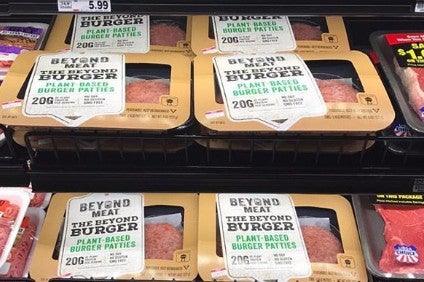In the US, in two decades, plant-based food and beverages have grown from something even smaller than a niche to commanding increasing amounts of shelf-space. just-food’s US columnist, Victor Martino, says 2017 was the tipping point for the category and predicts growth is only set to continue.
As recent as two decades ago it was a challenge to find enough branded plant-based food and beverage products to fill a four-foot section in a US supermarket. The word niche is an understatement.
Fast-forward to today, a mere 20 years later, and virtually every section of the US grocery store – from the centre of the store and dairy case, to the meat case and service bakery department – stocks plant-based food and drink items, many of which – alternative milk, yogurt, meats, cheese – are brands that have a mission to disrupt the conventional, status-quo products sitting nearby on the shelves.
What’s happening today is nothing short of a plant-based food and beverage product revolution.
The Plant-based Food Association and The Good Food Institute recently commissioned Nielsen to look at the current state of plant-based food and drink sales in the US.
According to Nielsen’s data – and the study is actually slightly more conservative than other, similar studies like one by SPINS, which is part of Nielsen – the plant-based food and drink channel in the US is at around US$3.1bn in annual sales, with year-over-year (end of August 2016 to end of August 2017) sales growth of 8.1%.

US Tariffs are shifting - will you react or anticipate?
Don’t let policy changes catch you off guard. Stay proactive with real-time data and expert analysis.
By GlobalDataSome categories within the segment, like plant-based yogurt (56%), are growing at such a high percentage rate that retailers are scrambling for shelf space for all the new brands and SKUs hitting the market. But finding room they are. Even conventional supermarkets and dollar-format stores, which shunned plant-based food and drink products for the most part as recent as only a few years ago, are stocking them.
For example, the huge Dollar General chain recently added soy and almond milk SKUs in the dairy case and has added some plant-based items to its very limited grocery product category selection in the core-of-the-store.
Online grocers like Amazon and others also are adding plant-based food and drink SKUs at a feverish pace. Prem Balwani, founder of Florida-based iGrabit, an online digital grocery platform that partners with bricks-and-mortar grocers, told me earlier this month plant-based foods are one of the top two or three product segment interests among the numerous grocers he talks with weekly.
In my analysis – and I’ve had direct involvement in the plant-based food and drink space since the early 1990s – 2017 will go down as the year a tipping point towards mainstream has been reached in plant-based foods.
Research firm Health Focus International recently found 17% of US consumers aged 15 to 70 claim to eat a predominantly plant-based diet, while 60% said they are cutting down significantly on meat-based products. Of those who are reducing their intake of animal-based proteins, 55% say the change is permanent, and 22% say they hope it to be permanent.
All surveys need to be looked at critically. But the last sentence above, which is the most important part of the data because it indicates strong intent for a permanent change, is backed up by similar data from researchers like NPD Group and others. Therefore, it has fairly high validity.
The most significant industry takeaway of what I’m declaring as a real revolution in the plant-based food and drink space is its implications for food processors, manufacturers and retailers.
Start-up and emerging brands, in conjunction with consumers, are driving the boom in the plant-based food and beverage channel.
Disruption of traditional, status-quo food segments like meat, dairy and others is the objective. Plant-based milks and yogurt. Plant-based hamburger created in a lab. Snacks made from chickpeas rather than potatoes. The list goes on and on.
These plant-based brands are resonating with consumers. It’s consumer desire and demand (pull) meets push (marketing).
These new-wave plant-based food and drink products are innovative, taste good (most do at least), have catchy brand names, and are being positioned and marketed creatively through the use of social media, grass-roots street teams and other inventive means. Most importantly, these plant-based brands are resonating with consumers. It’s consumer desire and demand (pull) meets push (marketing).
Big food companies have primarily adopted acquisition of these smaller brands as their way of getting a stake in the space.
This is starting to change a bit – and it needs to – as the big food companies are coming to realise we just might be living in revolutionary times when it comes to the plant-based food and beverage space, and they need to do some innovating of their own.
But it’s the small, nimble start-up and emerging brands that will continue to lead the innovation in plant-based food and drink for a long time to come.
just-food columnist Victor Martino is a California-based strategic marketing and business development consultant, analyst, entrepreneur and writer, specialising in the food and grocery industry. victormartino415@gmail.com and www.twitter.com/nsfoodsmemo.





